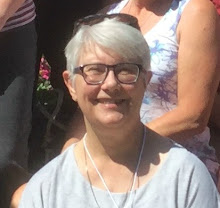my father aged 10 or 12 in the small photo; wearing his army uniform about age 22
My father, Fred William Holzworth, born in Red Rock (a village about 20 miles south of Prince George), died in Prince George 1975.
The Holzworth family, his branch of it, followed a brother to the United States in the early years of the 1900s. I'm not exactly sure when. I have been thinking of digging into Ancestry.com to find out more, but I have to pay for their services to get the records I want to see. Even then, there is no guarantee I'll find anything. Family myth was that the family arrived by boat in San Francisco. I'm doubting that story as the more usual route was Europe to New York, then train across the country. My mother's memory was frequently embellished with details that she would have liked to be true because it made for a better story!
All I know for sure is that my father's parents were named Peter Holzworth and Wilhelmina (Stephans or Stevens, or some such variation). Two of the daughters were born in Canada, so at some point they headed north, first to the prairies where Emma and Edith were born, then my father here in 1919.
They identified as German - spoke German, talked of family left in Germany during WWII. I only really knew my aunt Elizabeth who was the eldest daughter.
She died in 1965 or 6, my memory on that is hazy and again, I'd like to dig into the family history further to understand the family time line better.
My father was the youngest child and again my mother told stories about the family dynamic which I have no way of proving one way or another. I do know that my father's mother died when he was 10 and that apparently his father was withdrawn and 'cold'. Maybe because he was left with wrestling a farm out of the 'wilderness' and 8 children to provide for?
The village school burned down before dad was old enough to attend, and the two eldest children took over a rudimentary 'education' of the younger ones. My father had about a grade two level in reading. He was very intelligent - just never had an opportunity to educate himself.
When WWII began in 1939 men were encouraged and then required to report for duty. Family myth talks about my father being asked if he was ready to go fight the Hun and his equivocal response. When I requested his army records, no mention was made of a psych evaluation to find out why he wasn't raring to go to war as mom used to contend. They did mention he was 'dull', probably because he couldn't read very well due to a lack of schooling.
Because of his ties to family still in Germany (I suppose) he was sent to the Aleutians for the first part of the war. But when they were preparing for D-day, he was sent overseas to England.
He did talk about the ocean voyage and the sea sickness and how he managed to get through it with the generous assistance and encouragement of the merchant seamen - tips he passed on to me when I set off for Sweden via a freighter in 1969.
He fondly remembered England and the generosity of the people there who had been dealing with war rationing and so on for years by this point.
In the 1960s the BBC (I think) commissioned a documentary series called The World at War. The CBC ran it and repeated it at times throughout my teen years and every time it was on the schedule, my father would sit in his recliner and watch intently. When the program was on, we were to be quiet and not make noise, dad was watching 'his' program. He would sit, hands usually clasped, index fingers steepled, resting on his lips, elbows supported by the arms of his chair. He would watch intently, saying nothing, until a certain scene showing the D-day beaches. When a particular beach was shown, he would move his hands toward the screen with his fingers pointing at the tv and quietly say "I was there." My brother and I would gaze at the screen, watching the men jumping into the water, running as best they could up the beach, dodging bullets, some falling, never to get up again, wondering which speck was him, wondering how he survived, how he was able to come home again faced with such an event.
He was part of the force that went to Holland, and if he talked about the war, he expressed the desire to see the tulip fields without the bomb craters.
We learned to never ask him about the war. But he showed us by his attention to that documentary what war was.
Lately I have been wondering what he would think about what is happening now, today. And if he would talk about the war, why it happened, what lessons he would share about the rise of white supremacy and the neo-Nazi movement here and elsewhere in the world.




3 comments:
His grave is here: https://www.findagrave.com/memorial/110446946/fred-william-holzworth
I found the family, Peter and Willamena with their children Leo, Jacob, Elizabeth and Arthur in White Stone, North Dakota in the 1910 US census.
I looked up these records on FamilySearch.com, which is free if you register. I created a small tree for the family. Peter’s ID is G3JZ-TCW.
I am Deborah Bennett, degb (at) alumni (dot) rice (dot) edu. We have met - I know Ruth and Tien and was at your book launch lunch in San Jose.
Cool! Thanks. I will follow up on the family when I get home from my trip. :) Nice to hear from you. I'm hoping to find out more about the family. Dad (1975), my brother Don (2008) and mom (2016) are in the same plot - together again...
Post a Comment